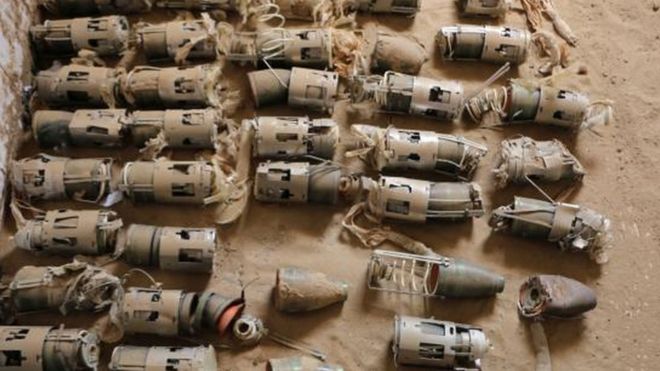 On Monday, December 19th, British Defense
Secretary Michael Fallon told the House of Commons that following the UK’s own
analysis, the Saudi-led coalition has now admitted to using UK manufactured
cluster munitions in Yemen. Following
months of denial by the Brits and the Saudis, this admission responded to an
earlier Amnesty International report documenting a cluster bomb found in a
northern Yemeni province.
On Monday, December 19th, British Defense
Secretary Michael Fallon told the House of Commons that following the UK’s own
analysis, the Saudi-led coalition has now admitted to using UK manufactured
cluster munitions in Yemen. Following
months of denial by the Brits and the Saudis, this admission responded to an
earlier Amnesty International report documenting a cluster bomb found in a
northern Yemeni province.
Cluster bombs contain hundreds of bomblets, which are meant
to detonate on impact; failure to detonate has the effect of sowing a
minefield. Cluster bombs, like
landmines, can lie in the ground for decades and go off at the slightest
provocation terrorizing the civilian population. As one jurist has noted, “Outside of nuclear
weapons, biological weapons, or poison gas, it is hard to imagine a weapon more
harmful to human beings than cluster bombs.”
In order to end their use a treaty was adopted in 2008.
The 2008 Convention on Cluster Munitions (CCM) entered into
force in 2010. The CCM obliges every
state party “never under any circumstances to”:
“(a) Use cluster munitions; (b) Develop, produce, otherwise acquire,
stockpile, retain or transfer to anyone, directly or indirectly, cluster
munitions; (c) Assist, encourage or induce anyone to engage in any activity
prohibited to a State Party under this Convention.” The United Kingdom, but not the US or Saudi
Arabia, is a party to the CCM.
Saudi Arabia, in its defense, noted that: “Neither the
Kingdom of Saudi Arabia nor its Coalition partners are State Parties to the
2008 Convention, and accordingly, the Coalition’s use of cluster munitions does
not violate the obligations of these States under international law.” All the same, the Saudis noted, they would
cease using these specifically UK manufactured cluster bombs.
No comments:
Post a Comment
Comments are subject to moderation and must be submitted under your real name. Anonymous comments will not be posted (even though the form seems to permit them).